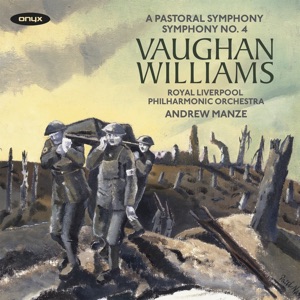This second release in Manze’s ongoing Vaughan Williams cycle, containing A Pastoral Symphony and Symphony No. 4, isn’t quite as good as its predecessor. It could be that Manze has spent a bit too much time in the early music world, because the latter work’s fleet delivery and clipped articulation sound almost neo-baroque, when the music demands heaviness and power. It’s not really a matter of tempo, although Manze’s first movement arguably flies by too quickly. The slow movement is correctly paced, while the scherzo and finale are quite exciting. They just lack that last ounce of ferocity and bite.
This is less of an issue in A Pastoral Symphony, except for the scherzo, where the brass could use more “oomph.” In this work, for the most part, Manze’s fluidity of rhythm and clarity of texture often seem just right. He uses a tenor for the vocalizes in the finale, a legitimate option, but for the notes to suggest that this somehow sounds more “warlike,” calling the work RVW’s “War Requiem,” is just silly and unmusical. The music has power and depth enough without being turned into a meditation on human misery. Throughout, the Royal Liverpool Philharmonic plays very well, giving Manze exactly what he wants. He just needs to learn that the romantic legato line, even in quick music, is not a crime.
































